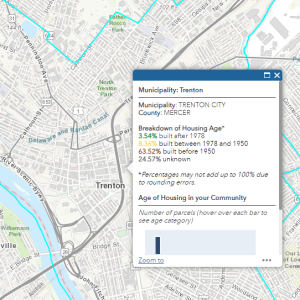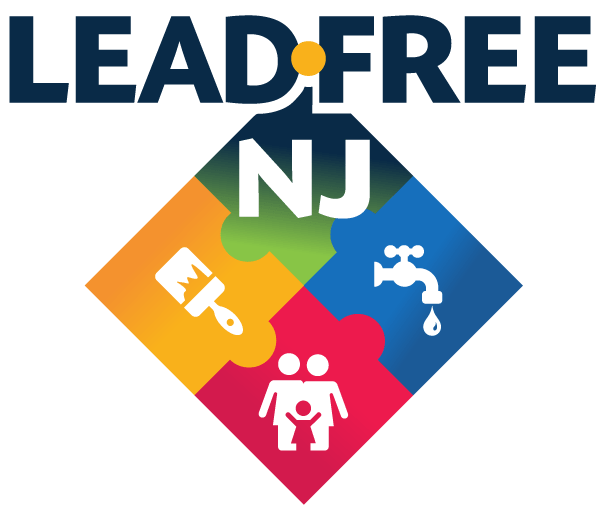Commissioners Call for Cross-Departmental Collaboration, Information Transparency, and Systems Shift to Address Lead Poisoning in New Jersey

Pictured from left to right: Shawn LaTourette, Commissioner of the New Jersey Department of Environmental Protection (NJDEP), Jacquelyn Suárez, Commissioner of the New Jersey Department of Community Affairs (NJDCA), Dr. Kaitlin Baston, Commissioner of the New Jersey Department of Health (NJDOH)
“I want this interdepartmental collaboration that we’re showing you here to be something that people hold in their minds,” remarked Dr. Kaitlin Baston, Commissioner of the New Jersey Department of Health (NJDOH) as she delivered her closing response to a panel presentation last month. The panel, “State of the State of Lead Poisoning Prevention in New Jersey”, with Baston, Shawn LaTourette, Commissioner of the New Jersey Department of Environmental Protection (NJDEP) and Jacquelyn Suárez, Commissioner of the New Jersey Department of Community Affairs (NJDCA), was moderated by Ruth Ann North, President of Green and Healthy Homes Initiative. Those who didn’t see this demonstration of interagency unity in person at the NJ Convening on Healthy Homes and Lead Poisoning Prevention hosted by Green and Healthy Homes Initiative and Southern New Jersey Perinatal Cooperative can watch a recording here and read a summary below.
Exposure to lead, a heavy metal commonly found in old paint, contaminated soil, drinking water pipes, and even some consumer and food items, is unsafe at any level of exposure because it accumulates in the body and can damage the brain and other organs. Due to the prevalence of lead in different areas of our environment and its significant impact on public health, several state agencies have authority over initiatives to protect the public from lead exposure.
Unprecedented funding and state laws for lead exposure prevention have established New Jersey as a national leader in this effort, and present an opportunity to safeguard the health of New Jerseyans for generations to come. Still, we must work together to deliver on our promises and ensure these funds reach the people most susceptible to lead exposure. To make the most significant impact during this moment, state agencies must coordinate and align their efforts.
Cross-Departmental Collaboration with a Deadline Looming
New Jersey dedicated $170 million of federal American Rescue Plan Act funds to lead paint remediation, the country’s largest investment of its kind. NJDCA Commissioner Suárez spoke about her department’s goal of integrating processes with NJDOH as a critical part of their plan to spend these funds before they expire at the end of 2026. While NJDCA is providing free lead paint testing, remediation, and/or abatement to income-eligible households and NJDOH is enforcing blood lead level testing for every child at ages one and two, it only makes sense to join forces. Commissioner Suárez described their vision: “Between DOH and DCA, we are trying to figure out streamlining the process so there will be some automatic notifications so we can get those tests for the property done immediately, then get them abated or remediated as appropriate.”
Despite lead paint being the most significant contributor to childhood lead poisoning, NJDCA has spent so far only $15 million of the $170 million in federal funding that expires by the end of 2026. The time is now for collaborative efforts to make as many households as possible safe from lead paint hazards.
Empowerment through Information Transparency
The commissioners described their efforts to make information more accessible to the public to empower New Jerseyans to understand and take action on potential lead exposure. NJDEP Commissioner Sean LaTourette showcased the Potential Lead Exposure Mapping (PLEM) tool, a joint venture from NJDEP, NJDOH, and NJDCA that maps the age of New Jersey housing stock to determine the likelihood that lead paint is present at a given address. Future updates to this tool will integrate potential risks from known contaminated sites and lead in drinking water. To see up-to-date information on potential lead in drinking water, the public should contact their water utility, which is required to report known lead service lines to the NJDEP every year by July and replace ten percent of these lines yearly. Commissioner LaTourette also shared that he recently petitioned the United States Environmental Protection Agency (USEPA) to list the East Trenton neighborhood as a Superfund site, which would bring awareness and resources to address lead in soil contamination from historic pottery manufacturing.
NJDEP, NJDOH, and NJDCA that maps the age of New Jersey housing stock to determine the likelihood that lead paint is present at a given address. Future updates to this tool will integrate potential risks from known contaminated sites and lead in drinking water. To see up-to-date information on potential lead in drinking water, the public should contact their water utility, which is required to report known lead service lines to the NJDEP every year by July and replace ten percent of these lines yearly. Commissioner LaTourette also shared that he recently petitioned the United States Environmental Protection Agency (USEPA) to list the East Trenton neighborhood as a Superfund site, which would bring awareness and resources to address lead in soil contamination from historic pottery manufacturing.
Pictured right: Screenshot from NJ PLEM shows the age of housing stock in Trenton, NJ
Commissioner Baston shared that her department is working on state regulation to lower the threshold for childhood blood lead test results so the health department can contact families sooner. She is also working on an initiative to make blood lead test results available on the mobile app that holds vaccine information, Docket. 
The NJ DCA is hard at work implementing New Jersey state law requiring lead paint inspections of rental housing by July 22, 2024. To comply, landlords must proactively inspect for and address lead paint hazards and report this information to the municipality. NJDCA has also launched a public awareness campaign to spread information about the law and available resources for free lead paint remediation and/or abatement.
Long-Term Vision of Systems Shift
The commissioners also stood united in their belief that systems-level changes are needed to improve health through long-term solutions that address root causes, particularly home and environmental conditions. As Commissioner Suárez put it, “How do we get creative so our solutions are going to change the root of the problem, as opposed to just ancillarily making things better in the short term?” She cited the state’s new rental assistance to homeownership program that will reduce barriers to homeownership and address the generational and racial wealth gap as an example of a program that strives for long-term solutions.
Commissioner Baston called for greater investments in public health and primary care to prevent chronic and acute diseases by addressing social determinants of health. She pointed out that one of the greatest determinants of health is your zip code, explaining that the conditions of the location where you live can impact your life expectancy by up to 30 years due to institutional racism, poverty, trauma, and other factors. As she put it: “your environment and what you’re surrounded by every day matters so much more than anything that in some ways feels in your control.”
Lead is an environmental justice issue that touches all but has had the largest impact on low-income and Black and brown communities. Commissioner LaTourette emphasized the conditions of inequity that we should center in this work, reminding us that “we find these greatest sources of environmental risks to our health co-located in the lowest wealth, blackest, and brownest parts of our state and our country. That’s an environmental injustice.” He applauded the state government for passing the first-of-its-kind law that requires NJDEP to consider environmental and health impacts for permits in overburdened communities.
Collaboration is Key and Must be Sustained
Commissioners Baston, LaTourette, and Suárez have now publicly cemented their unified front to address lead exposure prevention through cross-departmental collaboration. In January of this year, Commissioner Baston and Assistant Commissioner Janel Winter of NJDCA met separately with members of Lead-Free NJ, who advocated for sustained collaboration between the agencies. During this panel presentation, Heather Sorge, Program Manager of Lead-Free NJ, thanked the Commissioners for working together to see this collaboration of agencies is established, and for taking the time to meet with community members.
Deadlines loom for NJDEP to support water utilities in replacing all lead service lines by 2031, for NJDCA to spend $170 million for lead paint remediation by the end of 2026, and for NJDCA to enforce lead paint inspections of rental units by July 22, 2024. Not present at this discussion, the NJ Department of Education is under scrutiny after reporters from the Jersey Vindicator found that only $6.6 million of $100 million dedicated for lead in drinking water in 2019 was spent. To confront lead hazards head-on, all state departments must take responsibility for their role in the solution and be receptive to collaborative approaches, as Commissioners Baston, LaTourette, and Suárez modeled.
Join Lead-Free NJ today to participate in a collaborative effort advocating for equitable policy change and holistic lead remediation by centering community voices. Sign up here or contact info@leadfreenj.org Lead-Free NJ is an inclusive collaborative created to ensure that New Jersey’s children are free from lead poisoning and that our environment is lead-safe by advocating for changes to state and local policy.
